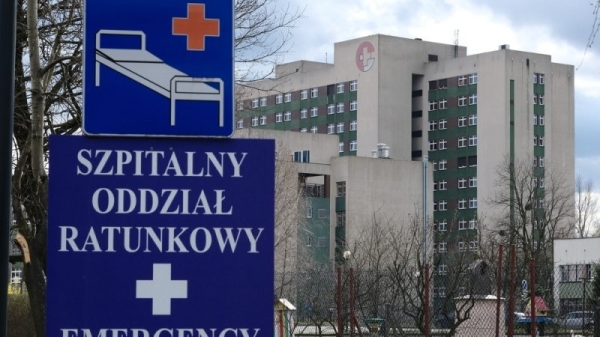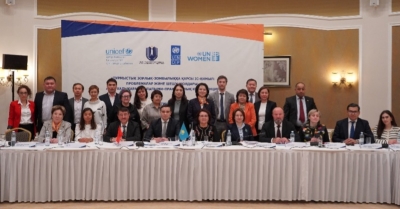Poland’s health system not affected ‘yet’ by increasing doctors’ exodus

The growing migration of doctors outside Poland has not yet impacted the healthcare system, stakeholders told EURACTIV Poland, however, if trends continue, then the impact will be felt.
Hoping for better working conditions and higher salaries, Polish doctors increasingly apply to the Supreme Chamber of Physicians (NIL) for a certificate confirming that they are qualified to practice their profession and pursue a career abroad.
Healthcare professionals stress that the situation in Poland is better than a few years ago, although 2022 was a record year for applications.
“The outflow of workforce is most visible in hospitals. However, doctors leaving them do not always go abroad; they also take up jobs in infirmaries and clinics, both private and public. There are better working conditions and pays there,” Doctor Jakub Kosikowski, acting spokesperson for the NIL, told EURACTIV.
“Doctors are still leaving, but the annual total of requests for documentation to leave is less than one per cent of all doctors in our healthcare system,” he added.
He explained that the “medical exodus” in recent years has been relatively stable, but 2022 – the first post-pandemic year – faces more than 50% in certificates issued.

Brussels urged to address EU health workforce ‘ticking bomb’
An increasingly disproportional migration of health workers within the EU has resulted in a workforce crisis as several member states are faced with staff shortages putting health systems’ sustainability at risk.
For Kosikowski, such an increase could be attributed to doctors’ fatigue with the system’s inadequacies, which the pandemic mercilessly exposed.
On the other hand, he added, changes in recent years have made Polish healthcare more competitive.
He cited the abolition of limits on the performance of specific procedures as an example.
“This has made it possible to do away with the annual reduction in the activities of many wards and outpatient clinics due to the exhaustion of contracts. As a result, trips are no longer motivated purely financially, as was the case years ago,” he said.
In 2022, NIL issued 887 certificates, 220 documents for dentists and 346 speciality equivalence letters.
Since 2018, 3,445 doctors and 730 dentists have applied for documents allowing them to emigrate.
Thus, one can see an upward trend, temporarily interrupted by years of intense fight against the COVID-19 pandemic and increased health system work.
How increased salaries helped
A Polish health ministry spokesperson told EURACTIV that currently, Warsaw is not dealing with an increased emigration of medical personnel, but on the contrary, it’s being noticed an increased influx of staff into the health care system.
“The first effects are beginning to be seen in increased enrolments in medical studies. We also see an influx of doctors from abroad, mainly from Ukraine and Belarus, under the fast-track work permit procedure. Today there are nearly 4,500 doctors”, the spokesperson said.
Regarding the salaries, the ministry official said they were increased in recent years and are now “comparable” with the cost of living in other EU countries.
“Those applying today for confirmation of their qualifications after graduation are often students from abroad who have come to Poland with the sole purpose of obtaining a medical degree”, he added.

Migrant workers keep German care system afloat, say experts
The German health and old-age care system is dependent on migrant workers, according to experts, with 690,000 people born in another country working in the sector.
The impact will be noticeable
Sebastian Goncerz, chairman of the Residents’ Agreement, confirmed the rising migration trend of health workers, saying about one-third of medical students declare their intention to leave the country.
“The main reasons cited are the working and development conditions, the atmosphere in the workplaces, unsatisfactory salaries, but also the political and social situation in the country, which is often the main reason for the decision to emigrate,” the doctor said.
“The retreat of the specialised doctors into private clinics is more problematic in Poland than the medical staff emigration into the West”, he added.
Goncerz explained that migration is not “massive” for now but is accelerating, and “we can expect its impact on health care to become much more noticeable”.
Moreover, the Polish doctor noted that a dramatic increase in the emigration of healthcare workers and employees is expected due to a significant increase in the number of medical students trained in Poland.
“If, according to the health minister’s plans, we reach an annual ceiling of 14,000 first-year students in this field nationwide, this will give us about 36 medical graduates per year per 100,000 inhabitants,” he said, adding that the EU average in 2019 was around 12.
Wrong policy choices
Polish young doctors insist that the state focuses on the wrong investments that exacerbate the emigration problem rather than eliminate it.
“The massive increase in the number of medical faculties, in the absence of improvements in working conditions and healthcare funding, and the politicised narrative towards doctors or social minorities discourage residents from staying in Poland,” Goncerz said.
He emphasised that to halt migration, the state offers to pay the tuition fees for medical studies under the condition that the student chooses a deficit specialisation and later takes up a job in public health care for ten years after graduation.
“The medical community is very negative about this idea – the loan is at a variable interest rate, for a large amount and reduces creditworthiness up to 40. In addition, with the current increase in the number of doctors, there is no guarantee of employment”, Goncerz concluded.
Read more with EURACTIV




